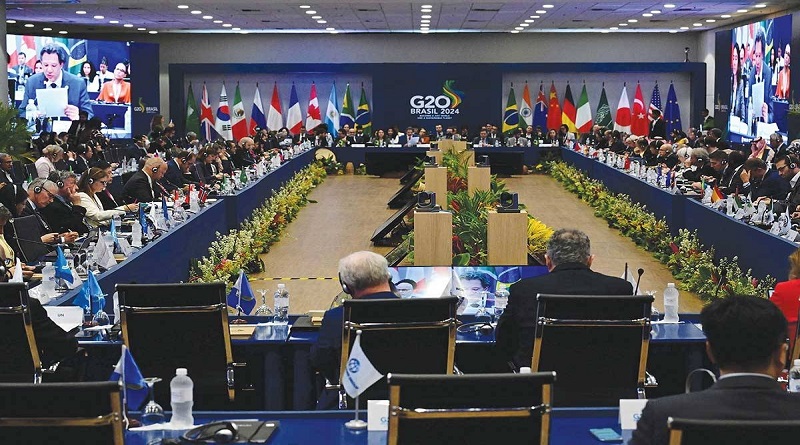Reactions trail G20 finance Ministers plan to tax billionaires to tackle poverty, climate crisis
Civil society organizations have reacted to the G20 Finance Ministers statement, from their meeting in Rio de Janeiro on Friday 26 July 2024, endorsing Brazil’s proposal for a global tax on individuals with a net worth of over $1 billion, pending approval by Heads of State at the G20 Leaders Summit this November. While the statement falls short of mentioning Brazil’s proposition for a 2% tax on the ultra wealthy, it is a major step forwards, reflecting the growing momentum and public support for a global tax on billionaires to tackle poverty and the climate crisis.
Brazil, in its current role as chair of the G20, with the support of countries like France, Spain, Colombia and the African Union were outspoken in favour of new global measures to tax billionaires. They faced down opposition from US Finance Minister Janet Yellen and her German counterpart Christian Lidner who have been critical about the efficacy of a global wealth tax – despite a G20 commissioned report that demonstrates how to levy over $680 billion per year from the super-rich.
Public polling shows that more than two-thirds of people across seventeen G20 countries support billionaires paying higher taxes as a means of funding major improvements to the economy and lifestyles. More than 1.5 million people have already signed a petition for a global wealth tax, which was handed over to the Finance Minister of Brazil, Fernando Haddad, during the G20 meeting.
New research, published on 25 July 2024, shows that the wealthiest 1% have grown richer by $40 trillion in the last decade. Now, as the pressure grows, Heads of State must commit to tax their billions ahead of the crucial G20 Leaders Summit in November.
Alia Kajee, Global Campaign Manager at 350.org said: “G20 countries represent the overwhelming majority of global GDP, not to mention global emissions. The implementation of a wealth tax on the super-rich in these countries would significantly drive forward the just transition to renewable energy. We must continue building momentum as we move towards the G20 Leaders Summit and UN climate negotiations in Azerbaijan, just four months from now, where the issue of ‘who pays’ is poised to take center stage.
Right now, communities around the world are grappling with climate impacts and the increasingly exorbitant cost of living. A dual crisis that is driven by dual problems: our global reliance on fossil fuels and gross wealth inequality built into the global economy. Fossil fuel corporations alongside the world’s wealthiest people and nations are hoarding wealth at the expense of us all. It’s time they pay what they owe, and momentum is building for exactly that to happen.”
Andreas Sieber, Associate Director for Global Policy and Campaigns at 350.org said: “Our tax and financial systems are fundamentally biased towards the rich. Today, the G20 Finance Ministers signaled their willingness to change that — but to be more than words on paper the G20 leaders must establish a clear and actionable process for implementing an international taxation scheme, ensuring that funds are directed towards renewable energy investments benefiting communities.
It is a glaring injustice that billionaires amass vast fortunes while the world grapples with soaring energy bills. They must pay their fair share. A wealth tax could generate hundreds of billions annually, improving the lives of millions on the frontlines of the climate crisis. Redirecting these funds into climate finance is urgent and essential. As COP29 and the New Climate Finance Goal approach, policymakers from the Global North falsely claim there is no money. Yet, if billionaires contribute fairly, ample funds can protect the climate, fund education, and improve healthcare. A wealth tax represents a long overdue step towards economic justice.”
On the US government, Jeff Ordower, 350.org North America Director said: “The US’s failed efforts to oppose this global taxation on the super-rich is outrageous. If the US government continues to operate in this way it risks missing out on a golden opportunity to collaborate with the rest of the world on this billionaires tax, and it is shameful we are continuing to be a playground of the richest and most unaccountable. As even billionaire Warren Buffett has said, “he pays less tax than his secretary.” The United States continues to be a haven for the world’s billionaires, who have profited off of a round of tax cuts during the Trump administration that the Biden administration has not undone.”
On the UK government, Kate Blagojevic, Associate Director for Europe Campaigns and Organising at 350.org said: “There’s a big job to do to repair the UK’s reputation as a climate leader on the global stage. Backing a global wealth tax to help fund climate action is a start, now Rachel Reeves has to build on this at home and at the next G20 meeting in October. The government should take heed of the thousands of people across the UK calling for new taxes on the ultra-wealthy and jettison their timid position on taxing the rich. There is overwhelming public support for increasing taxes on billionaires and the Labour front bench must lead on the efforts to tax the super rich in the UK and around the world.”
On the German government, Nicolò Wojewoda, Regional Director for Europe at 350.org said: “The G20 statement to tax billionaires was delivered despite, not thanks to, the German government – it needs to get its house in order. On one hand Ministers like Svenja Schulze are coming out in vocal support of a global wealth tax to tackle poverty and climate, and on the other Finance Minister Lindner is blocking progress at the international level. It is time for Chancellor Olaf Scholz to step in – the German public has suffered from catastrophic flooding in recent years, and the nation’s precarious reliance on Russian oil and gas was demonstrated by the war in Ukraine. It should be obvious to the German government that the need to accelerate the just transition to renewables at home, and around the world is urgent. Germany plays host to a range of high profile billionaires and is a crucial voice on the global stage – it has a duty to close tax loopholes and back, not block, a tax on billionaires’ wealth.”
On the French government, Fanny Petitbon, France Team Lead at 350.org said:“France’s support for a global wealth tax was critical. France can influence global economic policy, drawing on its solid track-record of finance innovation, such as the financial transaction tax or the levy on flight tickets to fund climate action. Unfortunately this track-record is at risk: in the chaotic wake of the French election President Macron is ignoring the population who voted in a government to deliver a green wealth tax, more ambitious climate action, reduced energy bills, increased investments in essential public services, and less inequality. Without strong, consistent national efforts to make the super rich pay what they owe, France’s voice will start to ring hollow in its support for global measures.”
On the Brazilian government, Ilan Zugman, 350.org Latin America Director based in Brazil said: “To build on successfully coordinating this joint statement, Minister Fernando Haddad has the moral imperative and responsibility to keep rallying G20 counterparts around the wealth tax proposal. The group must send a strong and unified signal to Heads of State and governments to take concrete action that delivers a global wealth tax on billionaires when they meet at the crucial Summit in Rio this November.
This is the kind of positive leadership that Brazil can, and must, keep exerting in climate negotiations. It is key that Brazil pushes for the implementation of this wealth tax if it wants to be the climate-forward nation it is striving to be internationally. Especially when, at home, the country is increasingly being impacted by unnatural disasters like the recent deadly flooding in our southern region. We are witnessing how the costs of inaction come at an intolerable price.
Also, as president of the G20 group and the COP presidency troika this year, as well as president of COP30 the next, it is high time for Brazil to to stop the smoke and mirrors approach. Brazil must align its national climate goals and commitments to phase out fossil fuels and to scale renewable energy projects towards a just energy transition that benefits people over profits.”




